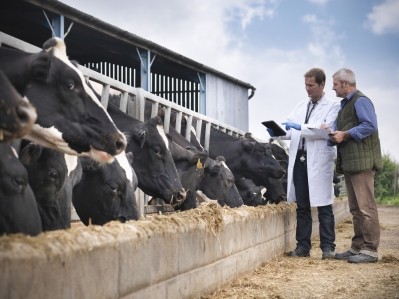Opinion
New UK border controls may cause anarchy

There is a degree of apathy among UK importers about the new, phased border control changes – possibly because the changes have already been delayed several times since 2021.
There is also a significant risk that a lack of preparedness around certification, staffing shortages and increased costs could add to delays at the border.
From 31 January 2024, under the Border Target Operating Model (BTOM), animals and plants imported from the EU into the UK will be categorised as either high, medium or low risk. Among other changes, this will require importers to obtain health certification from EU exporters for medium-risk imports, with meat and dairy products requiring a health certificate signed by a veterinarian. The changes also mean that medium risk and some low risk goods will need to provide pre-import notifications to the UK Authorities.
Medium-risk animal product imports from the EU, Iceland, Switzerland, Norway and Liechtenstein may be subject to random sample documentary checks. While low risk imports will require commercial documentation and, in some cases, import licences or authorisation.
From 30 April 2024 the second stage is slated to come into force: inspections on medium-risk goods, and all medium and low-risk goods required to enter the UK via a point of entry that has a relevant border control post.
The 31 October 2024 marks the third stage, in which safety and security (S&S) declarations for imports into Great Britain from the EU or other areas where the waiver applies, comes into effect. A reduced dataset for imports and use of the UK Single Trade Window will also be rolled out in an effort to lessen duplication across different pre-arrival datasets, such as pre-lodged customs declarations.
Are we sufficiently prepared for the changes?
Although the changes have been flagged – and their implementation delayed – for some time, there is a very real risk that many exporters have not sufficiently prepared. This may mean extra costs for UK businesses as well as supply chain crunches that could severely affect the quality of often time-sensitive food and beverage products.
In fact, according to a poll from the Institute of Export and International Trade last October, less than a fifth of UK businesses are clear about whether upcoming changes will affect them.
When asked how clear they were about whether the government’s BTOM will impact them, only 6% said they were ‘completely clear’, with another 16% saying they were just ‘clear’.
There is a very real likelihood that some EU Member States may not have the infrastructure in place to ensure that the necessary certification can be processed in time to enable goods to be shipped to the UK. This is a serious concern given that many products of animal or plant origin have a limited shelf life – and could lead to quality issues or shortages of certain goods. There is also a possible lack of awareness around the various risk ratings attached to certain goods, and these risk levels may be different in the EU.
It will, therefore, be critical for both the EU exporter and the UK buyer to check the UK risk ratings. Any misunderstanding here could result in delays in the clearance of goods at the UK border.
UK importers also need to be aware that the cost of border control checks may have an impact on their own business models. Many importers of animal and plant produce have contracts with supermarkets or other large retailers and will have agreed fixed contract prices for the 2024 year. This could cause serious difficulties for any importers that have been unable to factor additional costs associated with border control checks into their contracts by 30 April, when border control post (BCP) inspections will begin for medium-risk goods.
Adding to this uncertainty, the Sevington BCP in Kent, intended to be an inland border facility for heavy goods vehicles post-Brexit, is still not fully operational. The plan was that the Sevington BCP would be used for import checks for the port of Dover – often known as the ‘Gateway to Europe’. The fact that the Sevington BCP is not yet being used, coupled with potential staffing issues, could again result in delays to checks on goods and delay in delivery to the ultimate customer.
If consignments are held for longer than the current inspection standard of four hours of being presented for inspection, importers may be forced to take the decision to use a privately-operated BCP to complete checks. While this may result in goods being inspected and released more quickly, reducing the risk of spoiled goods, it would mean that importers would likely incur higher inspection fees.
In addition to concerns about the Sevington BCP’s functionality, another BCP in Portsmouth is also not yet operational, again running the risk that goods will be subject to potentially lengthy delays.
Importers also need to consider the fact that many vehicles entering the UK are carrying so-called ‘groupage loads’ importing goods for multiple consignees.
It’s possible to imagine a scenario whereby an importer of low-risk goods not requiring European Health Check or Phyto certification is struck by import delays because other importers’ goods in the same groupage load require additional checks because they are high or medium-risk. It is important that importers and hauliers are aware of this risk and take steps to avoid low-risk goods being delayed.
Actions to take to minimise disruption
There are a number of variables that could affect trade between 31 January and 30 April 2024. And many of these are beyond the control of UK importers.
There are steps that importers can take, however, to try to minimise the effect on their business. Firstly, regular communication between buyer and seller will be vital to manage the risk and try to ensure that certification goes smoothly.
Secondly, a review of current supply routes will help importers of certain goods to ensure that BCP checks can go ahead with the minimum of delay. Importers should also ensure they are talking to hauliers about how groupage loads will be handled and how they will try to avoid low-risk goods being snarled up in the BCP inspection processes. This will be vital to help maintain an effective supply chain and ensure that only medium and high-risk goods are processed through the BCP system.
We do not yet know how things will look when the border control changes come into force on in just a few weeks’ time (31 January 2024). But with very little time now left to prepare, we urge UK importers to talk to suppliers and hauliers to try to minimise disruption to their supply chains.

















